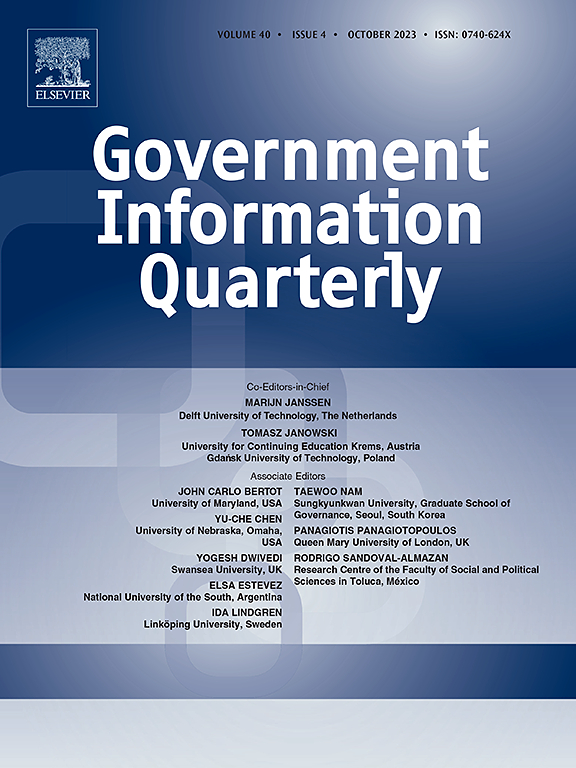State versus Technology: What drives trust in and usage of internet voting, institutional or technological trust?
IF 10
1区 管理学
Q1 INFORMATION SCIENCE & LIBRARY SCIENCE
引用次数: 0
Abstract
This study examines the combined influence of technological and institutional trust on citizens’ perceptions of and engagement with Internet voting, addressing gaps in the literature on digital governance and trust. While prior research often treats these trust dimensions separately, this article explores their interplay within the context of Estonia, which has utilized Internet voting for two decades. By constructing composite indices for technological and institutional trust through factor analysis, the study offers a novel methodological approach to operationalizing trust in digital governance (within the article, digital governance and e-governance are used interchangeably) research in general and Internet voting in particular, based on post-electoral survey data.
Applying linear and logistic regression analyses, the study explicitly examines how these trust dimensions affect citizens’ trust in Internet voting systems and their actual use of such technology. The findings reveal that institutional trust is significantly more influential than technological trust, consistently emerging as the primary driver for both trusting Internet voting and engaging in its usage. Technological trust, in contrast, demonstrates only marginal predictive strength, highlighting the greater importance citizens place on institutional legitimacy, transparency, and accountability. These results emphasize the compensatory nature of institutional trust, suggesting that robust institutional frameworks allow citizens to confidently engage with complex technological systems despite limited technical understanding. Consequently, this research enhances theoretical insights into trust dynamics within digital governance, particularly in contexts where political sensitivity and institutional credibility significantly impact technology adoption.
国家与技术:是什么推动了对互联网投票的信任和使用,是机构的信任还是技术的信任?
本研究考察了技术和制度信任对公民对互联网投票的看法和参与的综合影响,解决了数字治理和信任方面的文献空白。虽然先前的研究通常将这些信任维度分开对待,但本文在爱沙尼亚的背景下探讨了它们的相互作用,爱沙尼亚已经利用互联网投票二十年了。通过因子分析构建技术和制度信任的综合指数,本研究提供了一种基于选举后调查数据的数字治理(在本文中,数字治理和电子治理可互换使用)研究中的信任运作的新方法,特别是互联网投票研究。运用线性和逻辑回归分析,该研究明确考察了这些信任维度如何影响公民对互联网投票系统的信任以及他们对此类技术的实际使用。研究结果显示,制度信任比技术信任更有影响力,一直是信任互联网投票和参与互联网使用的主要驱动因素。相比之下,技术信任仅显示出微弱的预测力,凸显了公民对制度合法性、透明度和问责制的更大重视。这些结果强调了制度信任的补偿性,表明健全的制度框架使公民能够自信地参与复杂的技术系统,尽管技术理解有限。因此,本研究增强了对数字治理中信任动态的理论见解,特别是在政治敏感性和机构可信度显著影响技术采用的背景下。
本文章由计算机程序翻译,如有差异,请以英文原文为准。
求助全文
约1分钟内获得全文
求助全文
来源期刊

Government Information Quarterly
INFORMATION SCIENCE & LIBRARY SCIENCE-
CiteScore
15.70
自引率
16.70%
发文量
106
期刊介绍:
Government Information Quarterly (GIQ) delves into the convergence of policy, information technology, government, and the public. It explores the impact of policies on government information flows, the role of technology in innovative government services, and the dynamic between citizens and governing bodies in the digital age. GIQ serves as a premier journal, disseminating high-quality research and insights that bridge the realms of policy, information technology, government, and public engagement.
 求助内容:
求助内容: 应助结果提醒方式:
应助结果提醒方式:


